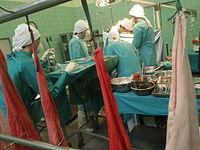
Photo from wikipedia
Objectives The gap between the numbers of organ donors and recipients is a common problem worldwide. This study was designed to investigate the importance of ‘individual readiness’, a here introduced… Click to show full abstract
Objectives The gap between the numbers of organ donors and recipients is a common problem worldwide. This study was designed to investigate the importance of ‘individual readiness’, a here introduced novel concept in transplantation medicine and a measure of positive attitudes towards organ donation and transplantation. Design A cross-sectional online survey was used to collect the research data. Participants The participants were recruited by a Japanese research company and affiliates in South Korea and Taiwan and fulfilled the following criteria: (1) laypersons aged 18–75 years, (2) residents of the countries and (3) understood the questions in their native languages. Primary outcome measures The survey investigated the interest and attitude of individuals regarding transplantation medicine by asking multiple choice questions. Based on answers concerning attitude, a positive group was identified as willing to be organ donors and recipients, and a non-positive group was identified as unwilling to be donors and recipients. The ratio between the positive and non-positive group, the P/N ratio, was introduced as an index of individual readiness. Results 1500 samples were included in this analysis. Individuals with interest agreed more with statements on organ donation than those without interest, and the P/N ratio per country was compatible with the actual deceased organ donors rate per million population (ADODR). Conclusions Interest in transplantation medicine was associated with positive attitudes, and positive attitudes were associated with a higher ADODR. These results support that individual readiness is an important determinant for the number of donors. The P/N ratio can be used as an index to assess individual readiness in organ transplantation, at least in countries with minor to moderate popularisation. Further studies of individual readiness using the P/N ratio should be undertaken to develop policies and initiatives for increasing organ donations.
Journal Title: BMJ Open
Year Published: 2022
Link to full text (if available)
Share on Social Media: Sign Up to like & get
recommendations!